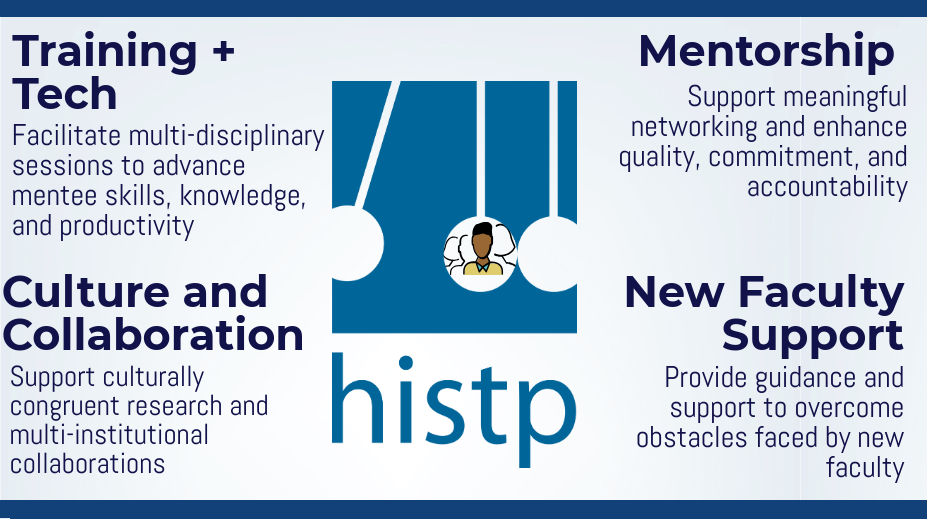Benefits
Those selected as HISTP scholars receive several benefits by participating. Read more below, including testimonials from former scholars.

-
Information exchange, in-person and at-a-distance at semi-annual institutes and events/design challenges at Columbia University
-
Extensive grant writing and peer support for funding proposals
"I was fortunate that HISTP was available to provide valuable resources to help me navigate my new role and benefit from positive interactions with giants in my field." --Nicole Ennis, PhD, University of Florida, who was recently awarded a K23 grant
-
Collaborate to address issues as a faculty member of color and overcoming barriers in academia
-
Exposure to effective, science-based approaches and implementation of community-level HIV prevention interventions
-
Mentor meetings and support
“As an HISTP Scholar, I benefited from opportunities to hear from experts in the field on grant writing skills, funding opportunities, and navigating academia as an ethnic minority female. An added bonus is that the mentor-mentee relationships and friendships formed throughout the program continue.” --Jamila K. Stockman, PhD, MPH, University of California, San Diego
-
Exposure to solving research problems through technology such as a Hardware Design Challenge (eg, wearables), Simcon, or Social Media Prototyping Lab
-
Experience in and knowledge of the latest scientific HIV research methodologies
“I feel like I gained a great deal of knowledge that I can apply in making my career and research successful. HISTP fellows are like a family to me and I also feel like my mentors will always be there to support us and showcase our work.” --Liliane Cambraia Windsor, Ph.D., MSW, University of Illinois at Urbana-Champaign
-
Collaborate with other scientists in similar field and world class mentors
"HISTP is an exceptional program for a variety of reasons. Relationship-building among our peers was key: I’m still in contact with everyone accepted in program. We have published together, seen one another at conferences, and talked about challenges as people of color in academic settings.” --Michele Rountree, PhD, University of Texas, Austin
Peer Reviews
The internal peer review process is designed to strengthen systematically the scientific rigor and presentation quality of a proposal before it is submitted for review by a funding agency.
Peer review committee
A peer review committee consists of 3-4 senior researchers affiliated with the center/program or a scientific consultant with relevant expertise; at least two members of a review committee will have experience serving on review committees.
Peer review structure
Fellows developing grant proposals typically undergo three formal, internal peer reviews:
- The first is held about 5 months before the submission deadline, whereby the mentee submits a document detailing the primary aims and a detailed outline of the study design; the peer review committee provides constructive feedback regarding selection, prioritization and wording of aims, as well as critiques—including pros and cons of possible alternative options—to ensure that the design positions the investigator to achieve the aims in the most rigorous and feasible manner.
- The second peer review is held about 3 months prior to the submission deadline, whereby the peer review committee reviews a draft of the entire main narrative to elucidate potential “fatal flaws;” means and mechanisms to increase the scientific rigor; and constructive feedback on strengthening the presentation regarding the significance, approach, innovation, and qualifications of the PI; and additional resources necessary to ensure the proposed work can be completed in a timely manner as well as maximize the quality and quantity of study deliverables.
- The third peer review is held around 4 weeks prior to submission, with the emphasis on refining and strengthening the existing proposal, or recommending the mentee postpone submission based on serious concerns and/or large-scale revisions needing to be implemented.
Mock Reviews
Mock Reviews simulate an actual meeting of a study section, except Scholars are allowed to observe the proceedings. Mock Reviews are held during Training Institutes and proceed as follows:
- Scholars/mentees submit drafts of their grant applications.
- Mock reviewers replicate the initial scoring, discussion/critique, and final scoring process in view of mentees.
- After final scoring, the “fourth wall” is broken and observers/mentees are allowed to ask the mock committee members questions, discuss their critiques and constructive feedback, answer questions, and collectively consider additional questions, suggestions, and options.
